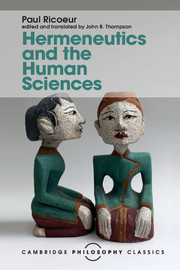Book contents
- Frontmatter
- Contents
- Preface to this edition
- Acknowledgements
- Editor's introduction
- Notes on editing and translating
- A response by Paul Ricoeur
- Part I Studies in the history of hermeneutics
- Part II Studies in the theory of interpretation
- Part III Studies in the philosophy of social science
- 8 The model of the text: meaningful action considered as a text
- 9 Science and ideology
- 10 The question of proof in Freud's psychoanalytic writings
- 11 The narrative function
- Select bibliography
- Index
8 - The model of the text: meaningful action considered as a text
from Part III - Studies in the philosophy of social science
Published online by Cambridge University Press: 05 July 2016
- Frontmatter
- Contents
- Preface to this edition
- Acknowledgements
- Editor's introduction
- Notes on editing and translating
- A response by Paul Ricoeur
- Part I Studies in the history of hermeneutics
- Part II Studies in the theory of interpretation
- Part III Studies in the philosophy of social science
- 8 The model of the text: meaningful action considered as a text
- 9 Science and ideology
- 10 The question of proof in Freud's psychoanalytic writings
- 11 The narrative function
- Select bibliography
- Index
Summary
My aim in this essay is to test an hypothesis which I shall expound briefly.
I assume that the primary sense of the word ‘hermeneutics’ concerns the rules required for the interpretation of the written documents of our culture. In assuming this starting point I am remaining faithful to the concept of Auslegung as it was stated by Wilhelm Dilthey; whereas Verstehen (understanding, comprehension) relies on the recognition of what a foreign subject means or intends on the basis of all kinds of signs in which psychic life expresses itself (Lebensäusserungen), Auslegung (interpretation, exegesis) implies something more specific: it covers only a limited category of signs, those which are fixed by writing, including all the sorts of documents and monuments which entail a fixation similar to writing.
Now my hypothesis is this: if there are specific problems which are raised by the interpretation of texts because they are texts and not spoken language, and if these problems are the ones which constitute hermeneutics as such, then the human sciences may be said to be hermeneutical (1) inasmuch as their object displays some of the features constitutive of a text as text, and (2) inasmuch as their methodology develops the same kind of procedures as those of Auslegung or text-interpretation.
Hence the two questions to which my essay will be devoted are: (1) To what extent may we consider the notion of text as a good paradigm for the so-called object of the social sciences? (2) To what extent may we use the methodology of text-interpretation as a paradigm for interpretation in general in the field of the human sciences?
The paradigm of text
In order to justify the distinction between spoken and written language, I want to introduce a preliminary concept, that of discourse. It is as discourse that language is either spoken or written.
Now what is discourse? We shall not seek the answer from the logicians, not even from the exponents of linguistic analysis, but from the linguists themselves. Discourse is the counterpart of what linguists call language-systems or linguistic codes. Discourse is language-event or linguistic usage.
- Type
- Chapter
- Information
- Hermeneutics and the Human SciencesEssays on Language, Action and Interpretation, pp. 159 - 183Publisher: Cambridge University PressPrint publication year: 2016
- 29
- Cited by

